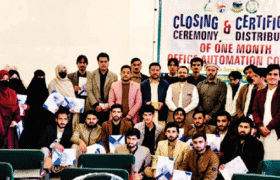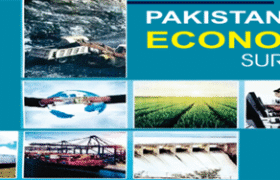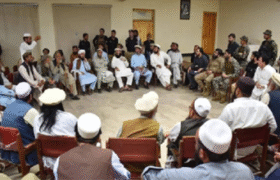The ruling party in Khyber Pakhtunkhwa (KP) remains a constant feature in the news. As the saying goes, “Some show signs of madness in love, while others drive people to madness” —Some disagreements naturally arise within the party, while certain elements fuel these disputes to stay in the headlines.
Last week, the Chief Minister stated in an interview that during the general elections, tickets for the provincial assembly were not issued to Shehram Tarakai, Asad Qaiser, and Atif Khan on Imran Khan’s orders because they were “conspirators” and had planned to create trouble in the provincial assembly. This implied that these individuals already had the backing of PTI’s founder before the elections, and a deliberate plan was in place to make one of them Chief Minister.
While this revelation was hardly surprising—since the denial of tickets was meant to keep them out of the assembly—it angered those labeled as conspirators. In response, the trio not only denied the CM’s claims but also demanded an investigation into what they called “baseless allegations” by Ali Amin Gandapur, though there was little substance to probe.
Reports suggest that when Atif Khan sought a provincial ticket before the elections, Imran Khan warned him that even his National Assembly ticket could be revoked, forcing him to back down. Similarly, when Junaid Akbar was given the provincial presidency, rumors swirled about Gandapur’s departure and Atif Khan being maneuvered into a provincial seat to become CM. Later, Speaker Babar Saleem Swati’s name also surfaced for the CM role, leading to political maneuvering that could cost him his speakership if he didn’t comply.
On Eid, Azam Swati met Imran Khan, after which rumors of the Speaker’s resignation circulated, though he chose silence and referred the matter to the party leadership.
For days, a war of words raged between the CM, Asad Qaiser, Atif Khan, Shehram Tarakai, and Timur Saleem Jhagra. Party leaders intervened, with Chairman Gohar Khan mediating to broker a truce. Though the reconciliation remains pending, insiders claim all parties will soon sit together to resolve grievances, ending this “storm in a teacup” and returning to business as usual.
International Conference and Mineral Legislation
The federal government organized an International Minerals Investment Conference in Islamabad to attract foreign investors for mineral exploration in Pakistan. While CMs from all provinces attended, KP’s Chief Minister kept his presence low-key.
PTI founder’s sister, Aleema Khan, reportedly advised the CM to delay mineral-related legislation in the provincial assembly until Imran Khan’s release. This drew criticism from informed circles, who argued that delaying laws needed to implement international agreements harms the province’s interests. Governance, they stressed, cannot hinge on a politician’s release.
Examinations Begin Amid Challenges
Annual exams for grades 9 and 10 have commenced under KP’s eight education boards, with 920,000 students participating. For the first time, private school students are taking exams in government centers. Section 144 is enforced near exam halls, and “pocket guides” (cheat sheets) are banned.
The provincial government claims to have eliminated discrimination between private and public school students while curbing the black market for exam halls. However, integrating private students into government centers poses logistical challenges.
To curb cheating, raids by boards and district administrations—sometimes involving armed guards—have intensified, causing stress and disruptions. Students caught cheating face public shaming on social media, adding mental distress. Power outages and heatwaves further exacerbate difficulties.
Local Representatives Seek Term Extension
KP’s local government representatives have petitioned the Peshawar High Court for a three-year extension. The Local Council Association, led by President Humayun Mayar and 29 nazims, argues that they were directly elected but stripped of funds and powers. The government has repeatedly violated the Local Councils Act, leaving many nazims without funds for three years and suspending them during elections.
The court has adjourned the hearing until April 24, directing the Advocate General to present arguments on the petition’s maintainability.
Afghan Refugees’ Repatriation
Since April 1, the deportation of Afghan refugees via the Torkham border has continued, with 11,371 sent back so far. The Peshawar High Court has barred the forced expulsion of Proof of Registration (PoR) cardholders until June 30, ordering authorities to comply with federal directives ensuring no harassment of legal refugees.
Note: Read the original Urdu article by Wisal Muhammad Khan: https://voiceofkp.org/kp-roundup-13-04-25/
(This English translation is provided for wider accessibility. Minor phrasing adjustments may exist, but the core content remains unchanged.)




